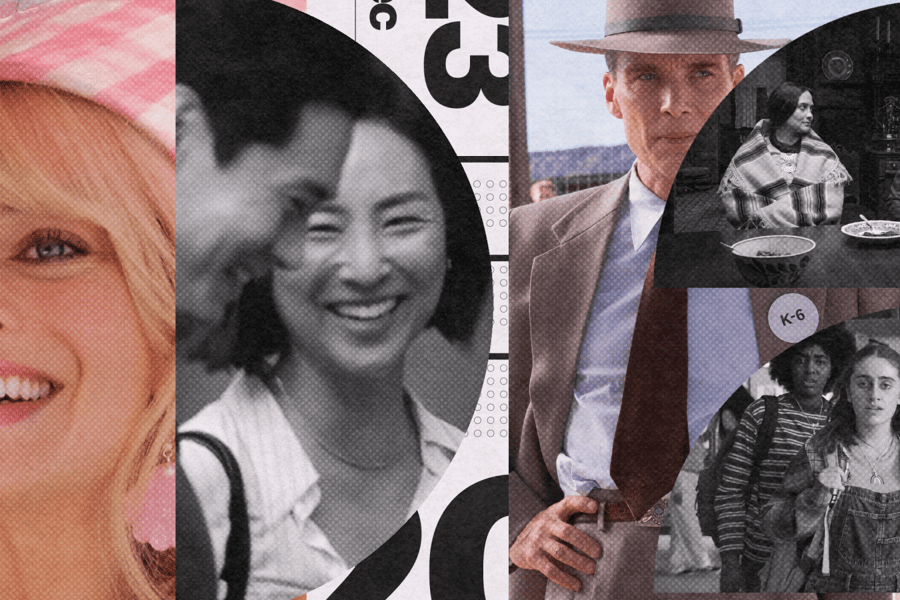20 Best Movies of 2023
From historical tragedies to raucous raunch-coms, Oppenheimer to Barbie — these were the films that made us think the movies are alive, well, and possibly better than ever

Illustration by Matthew Cooley. Dale Robinette/Warner Bros.; Jon Peck/A24; Melinda Sue Gordon/Universal Pictures; Melinda Sue Gordon/Apple TV+; ORION Pictures Inc.
HAD YOU TOLD us at the beginning of 2023 that an internet joke about summer-movie counterprogramming would give birth to a major pop-cultural phenomenon; that both a lo-fi Canadian horror flick and a $200 million epic from the greatest living American filmmaker would provide twin poles of cinematic ingenuity; that Marvel Studios would run into what’s possibly its own endgame in terms of keeping its successful cinematic universe afloat; that dual strikes from both the WGA and the Screen Actors Guild would nearly crater Hollywood entertainment as we know it; and that Taylor Swift would be the one to save the motion picture industry (not to mention the music industry, the NFL, and Western civilization as a whole), we might have questioned whether your crystal ball was on the fritz.
At the end of a long, unpredictable and thoroughly upended year at the movies, however, we know now that the double mantras for 2023 were: anything goes; and there is no such thing as a sure thing. This was a year in which disruption seemed to be the only constant, streamers continued to terraform the landscape of theatrical distribution (though they aren’t so stable either), and salvation seemed to come from some unlikely places. To go from “Barbenheimer? Seriously?” to “Barbenheimer! Seriously!!!” was a journey and then some. The hope is that even though the industry was reluctantly forced to recognize that, I dunno, people should be properly paid for their work and having software programs substituting for real people would be problematic (understatement alert!), the long, stalled summer of ’23 and the slightly delayed awards season will lead to genuine progress. Business as usual is no longer an option.
Not that all this sturm und drang and the feeling that things are very much still in a transactional phase stopped great movies from coming out. Both big studios and hipper, scrappier distributors hit the equivalent of home runs, critically and commercially. Festivals like Sundance, Cannes, and Venice delivered more than their share of spirit-raising, faith-restoring highlights. There were movies that harkened back to that ol’ time religion feel of Hollywood in its heyday, and those that reminded you that sometimes all you need is a phone, some actors, and a vision to make it work. Our top 20 movies for 2023 run the gamut in terms of genre, scope, running time, and subject matter. The only thing all of these have in common is that they reminded us of how thrilling it is to feel a sense of communion between the artists who make films and those of us who watch them. The circle remains unbroken in that respect.
(A quick note: We’re going by official theatrical release dates and not qualifying runs, which is why you will see titles like The Quiet Girl and Return to Seoul here, and will not see, say, Perfect Days and The Taste of Things— two great movies that officially bow in the first half of 2024 and will likely be on next year’s best-of list. Also, some additional 2023 shout-outs go out to: American Symphony, Earth Mama, Infinity Pool, May December, Menus-Plaisirs — Les Troisgos, Reality, R.M.N., Smoking Causes Coughing, Spider-Man: Across the Spider-Verse, A Thousand and One.)
From Rolling Stone US






















































